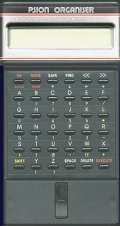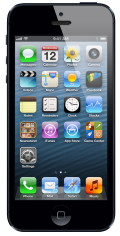|
Personal Digital Assistants (PDA)
|
From this . . . |
to |
To this . . . |
|
 |
in 30 years |
 |
|
Psion Organiser1 |
|
iPhone 5 |
These days, we take the features of the
iPhone and
other
Smartphones pretty much for granted, but in the same way
that home computers have progressed from the low power, 8-bit,
systems of the 1980s to the powerful high speed,
multi-processor, computers that abound
today, Personal Digital Assistants (PDA) have come a long way in
the same time. There are many, more comprehensive, sites on the
internet dedicated to particular manufacturer's PDA ranges, the
pages here are intended to provide a snapshot of the few PDAs
that I have actually owned.
Psion
introduced the
Psion Organiser in 1984, with an 0.9 MHz 8-bit Hitachi
processor, 4K ROM, 2K RAM, a 16
character, single line, display and a 6x6 keyboard with its
letters laid out alphabetically. The Organiser was the first affordable
(£99.95) "pocket" computer, but the first PDA really worthy of
the name was the
Psion Organiser II released two years later. There were a
number of Organiser II models, ranging in price
from £82 to £169, the top of the range model released in 1988
having a 20 character, four line, display, 64K ROM and 64K RAM.
The Organiser II was capable of interfacing with
external equipment and was used with industrial test equipment
and in the retail market.
Later PDAs in the Psion range dropped the "Organiser"
name, beginning with the
Series 3,
released in 1991. The Series 3 was a radically
different design from the Organiser, it featured a
compact "qwerty" keyboard and a much improved screen with 8
lines of 40 characters (240 X 80 pixels). The Series 3
had a NEC V30
4.7MHz 16-bit CPU, was available with 128kb (£179.00) or 256kb £249.00)
of RAM and featured built-in word processor, spread sheet and
database applications.
The next model in the Psion range was the
Series 3a,
released in 1993,with an upgraded CPU, a 7.68 MHz
NEC V30H
(80C86), initially available with 256kb and 512kb RAM versions,
1Mb and 2Mb models were added in 1995. The Psion 3a
had the same case design as the Series 3, but had
a higher resolution screen with a 480x160 pixel display.
I bought my first PDA, a Psion Series 3a in
1993 and followed this with a Psion Series 5 in 1997.
After Psion led the way, a number of manufacturers such as
Compaq (now
part of HP) and
Palm
(ditto) entered the PDA market, Compaq in particular produced a
nice range of devices, leading me to upgrade to the
Compaq Ipaq
3970 in 2001.
Details of my Series 3a, Series 5 and Ipaq PDAs are available
through the links on the menu bars.
I resisted the move to iPhone until 2008, when
I succumbed to the lure of the
iPhone 3G,
now I would not be without my
iPhones and
iPads of
course, and the days of separate mobile phones and PDAs has long
gone. iPhone releases have been many and often, so I don't
intend to document them here. The versions that I have had
include the
iPhone 4 (32GB),
iPhone 5S
(64GB), iPhone
6 (128GB), iPhone 8 (xGB) and
iPhone X
(256GB) (to date), all of which are well documented on
Wikipedia. I
have added a few pages on my iPads
though
1 Image
from http://www.bioeddie.co.uk/Psion/main/models/psion-organiser-1.htm
|